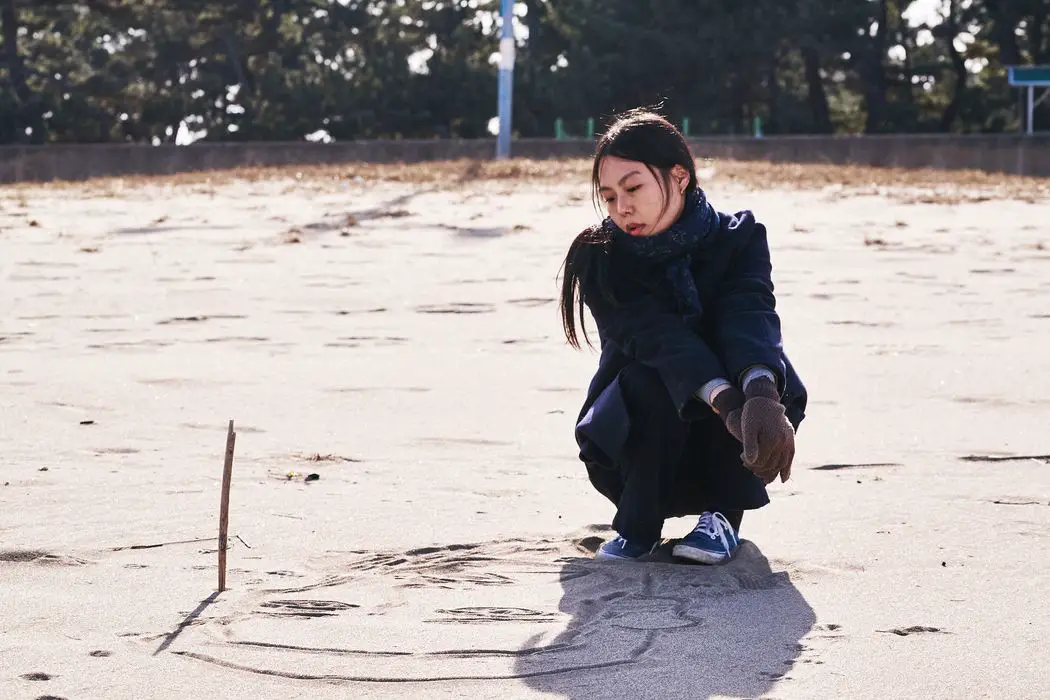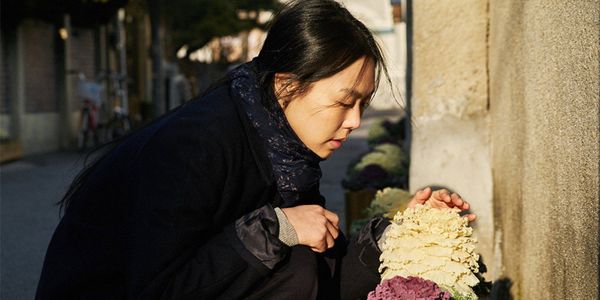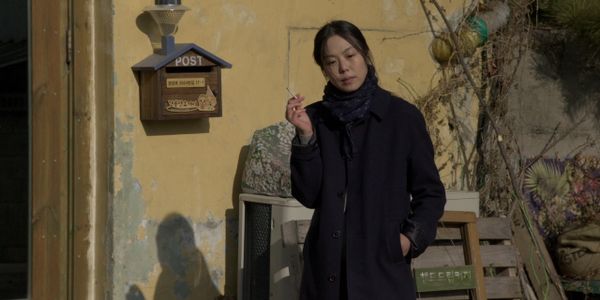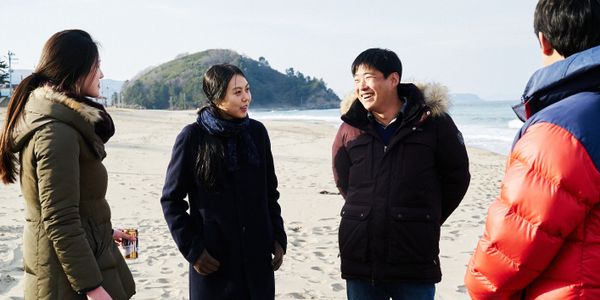ON THE BEACH AT NIGHT ALONE: Expelling The Sins Of The Past

Tomas is a chronic cineaste who studied English literature in…
In 2016, South Korean tabloids were abuzz with rumors about celebrated filmmaker Hong Sang-soo. They claimed that he was having an extramarital affair with actress Kim Min-hee, whom he first worked with in the 2015 feature Right Now, Wrong Then. The director’s wife spoke out to confirm the rumors, and last March, Hong and Kim jointly did the same at a press conference promoting On the Beach at Night Alone.
The truth is out, but anyone who knows the story and watches On the Beach at Night Alone will not have needed a verbal confession from Hong’s lips. It’s right there in the frames of the story. One could say in the very title, which is taken from one of Walt Whitman’s poems. Its latent imagery of being isolated on the edge of two boundaries (land and sea) without the capacity for sight feels apropos for the dysphoric feeling of guilt that one must assume Hong felt—and is still feeling.
Where fact and fiction meet
Interestingly, that guilt here is not directed at his spurned wife as one might assume. The only moment in the film that gestures to spousal apologia is when Young-hee (Kim Min-hee) takes a moment to kneel and bow deeply before crossing a footbridge in Hamburg. When pressed by her friend Jee-young (Seo Young-hwa), Young-hee reveals that she did it in prayer.
“To be strong, and whatever happens, to live my own way,” she explains. One may not make anything more of her action, except that Jee-young looks on at her in the background, on the other side of the bridge. It also does not seem coincidental that Seo could be around the same age as Hong’s wife (though this is merely speculation, since his wife’s name and appearance have not been made public).

Because On the Beach at Night Alone is divided into two uneven segments (and each with its own cinematographer), and because the first segment that features Seo clocks in at just under 30 minutes, I’m inclined to think Hong’s guilt is much more concentrated in his mistress, who is not only the star of the film, but may be playing a thinly fictional version of herself.
Young-hee is, after all, an actress of some regard who is constantly shadowed by the affair she had with a married filmmaker (surprise). In the first segment, she exiles herself in Germany while the media storm in her native land blows over. In the second segment, she returns (or is returned) to South Korea and is forced to meditate on the implications of her actions.
Thanks to Kim’s beautifully calibrated performance, we get to feel the full brunt of the anguish that this affair—and infidelity in general—can take on one’s being. In the first segment, when Young-hee is away from the reminders of her relationship, she is placid and reflective; her conversations with Jee-young are not marked by any specific sense of disorder, though the image of her lover clearly colors her worldview. At the end of the first segment, when she is taken to a beach for an evening walk, she impulsively draws his face in the sand, wondering aloud if he is still thinking of her.
Trauma and repercussions
It is only when the second segment arrives that Young-hee’s fragility is made apparent. Hong delineates the fracture of her selfhood with an ominous breakage of his own: when the first segment ends, a strange man is seen carrying a motionless Young-hee from the beach before anyone notices. There is no explanation for this event, for when the second segment begins, Young-hee is already back in South Korea and never mentions it to anyone.
Did it really happen? Was this contained within a dream or nightmare of hers? Is this trickster Hong surfacing to throw the audience for a loop, as he is wont to do? If there is no concrete answer, at the very least, it makes the film far less straightforward than it initially appears.

What is straightforward in the second segment is the change in Young-hee’s demeanor. As she meets up with old friends and they eat Korean staples and drink soju (a stable pattern in Hong’s filmography), the strain of her affair leads to aggressive emotional outbursts that dissipate as quickly as they come. Their genesis stems from a feeling of isolation: Who can understand how she has loved and why? Who can judge her actions without having experienced them?
It is at these moments that Kim throws her heart and soul into her character, peeling away her defenses bit by bit and imbuing her with a psychological acuity that clearly was informed by her own personal history with the man directing her behind the camera.
The Creator as creation
Speaking of the director, it should be no surprise to anyone watching the film that Hong makes an “unofficial” appearance as the character Sang-won (Moon Sung-keun). Their affair now ended, Young-hee and Sang-won dine together in one of the film’s final scenes, their reunion arranged when Sang-won’s film crew discover Young-hee lying on the beach outside her new apartment.
Because of how the film ends (which I won’t spoil), there is no certainty that this meeting takes place in the real world. It may be the work of Hong’s Godlike hand interfering with Young-hee’s narrative in the same way her mysterious abductor from the first segment reappears as a window washer at her apartment, unseen by everyone but us.

Whatever the circumstances, the scene between these former lovers is clicked into place by Sang-won’s abject misery and mea culpa, unravelling at the guilt and responsibility over Young-hee’s unhappiness. Moon’s breakdown is pathetic, but also touching. He recognizes that his actions have been a source of great pain, and opines that the regret will follow him to the grave.
There’s still a lingering feeling that this scenario is staged in service to the film’s story rather than being a slightly filtered self-flagellation on Hong’s part; however, because the spectre of guilt is contained within the very fabric of On the Beach at Night Alone, it is not a stretch to say that Hong is exorcizing something in putting it out there.
Conclusion: On the Beach at Night Alone
Hong Sang-soo’s films are not for everyone, and the ultra-specificity of On the Beach at Night Alone will be even more of a deterrent to those thinking of delving into his filmography. Indeed, I would not recommend it as a starting point myself, if only because Hong’s funnier side is more accessible.
That is not to say that On the Beach is a minor effort, however. As much as it is a personal work, it is also composed with a skilled hand that is capable of beguiling even the most careful of viewers. It denies us easy answers and practical explanations, while at the same time inviting connections to the artist’s past (and present).
It also holds yet another resplendent Kim Min-hee performance, and even if you don’t know it yet, that should be an incentive to give it your undivided attention.
Are you are fan of Hong Sang-soo’s work? If so, how does On the Beach at Night Alone square with his earlier films? Let us know in the comments below!
On the Beach at Night Alone received a limited release in New York last November. For future release dates, please click here.
Does content like this matter to you?
Become a Member and support film journalism. Unlock access to all of Film Inquiry`s great articles. Join a community of like-minded readers who are passionate about cinema - get access to our private members Network, give back to independent filmmakers, and more.
Tomas is a chronic cineaste who studied English literature in university (in both the undergraduate and graduate levels), and hopes to pursue a career in writing. His passion for film began in earnest at the beginning of the 2010s, and since then he's been reveling at the vast horizons of the cinematic landscape like a kid at the proverbial candy store.













